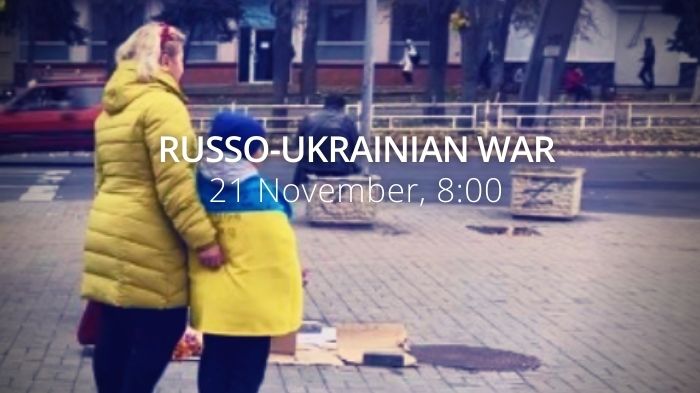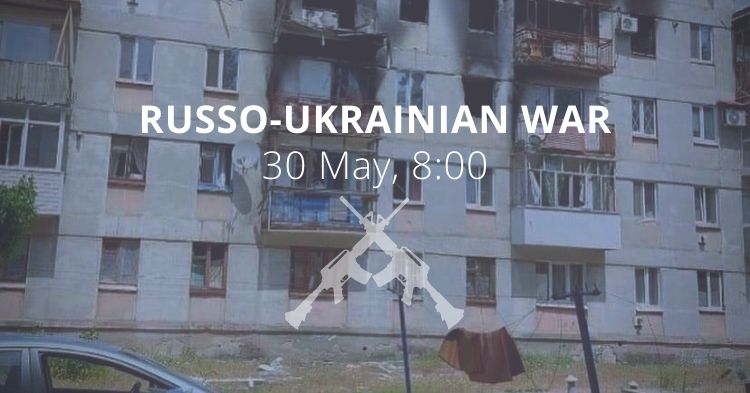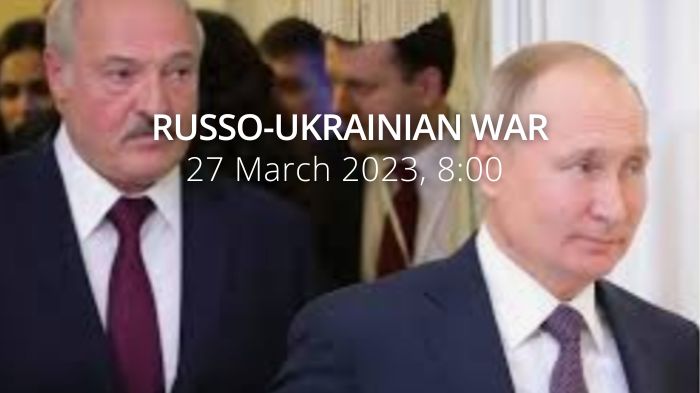Daily overview — Summary report, November 21
https://twitter.com/EuromaidanPress/status/1594435664619053057A map of the approximate situation on the ground in Ukraine as of 00:00 UTC 21/11/22. pic.twitter.com/7H7kfN3to4
— War Mapper (@War_Mapper) November 21, 2022
The General Staff’s operational update regarding the Russian invasion as of 06.00 am, November 21, 2022 is in the dropdown menu below:
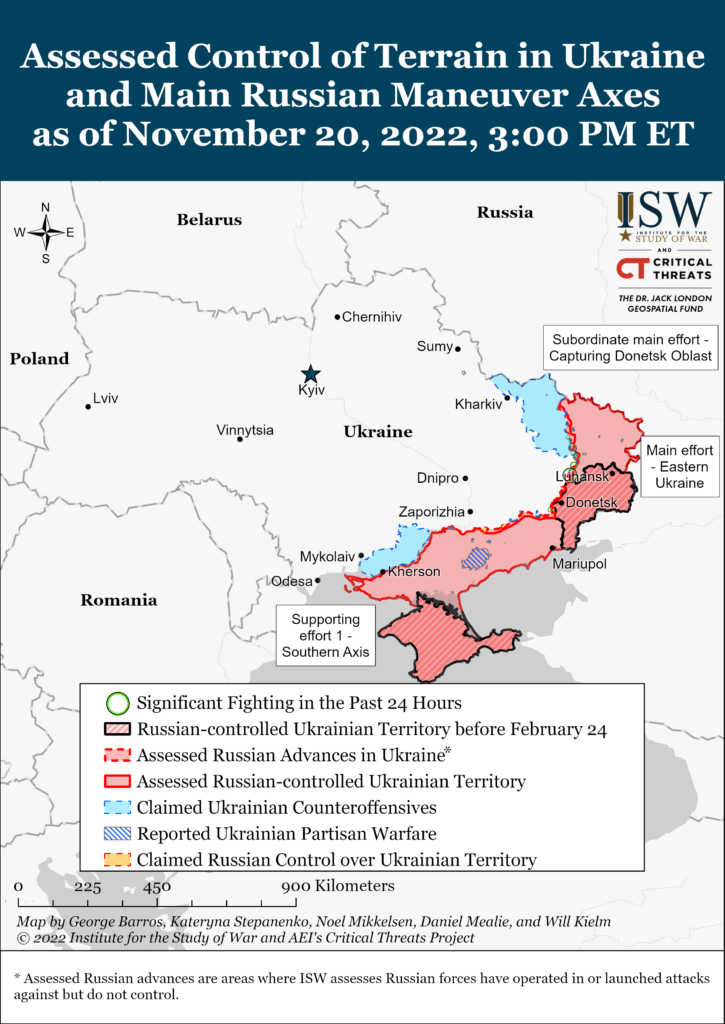
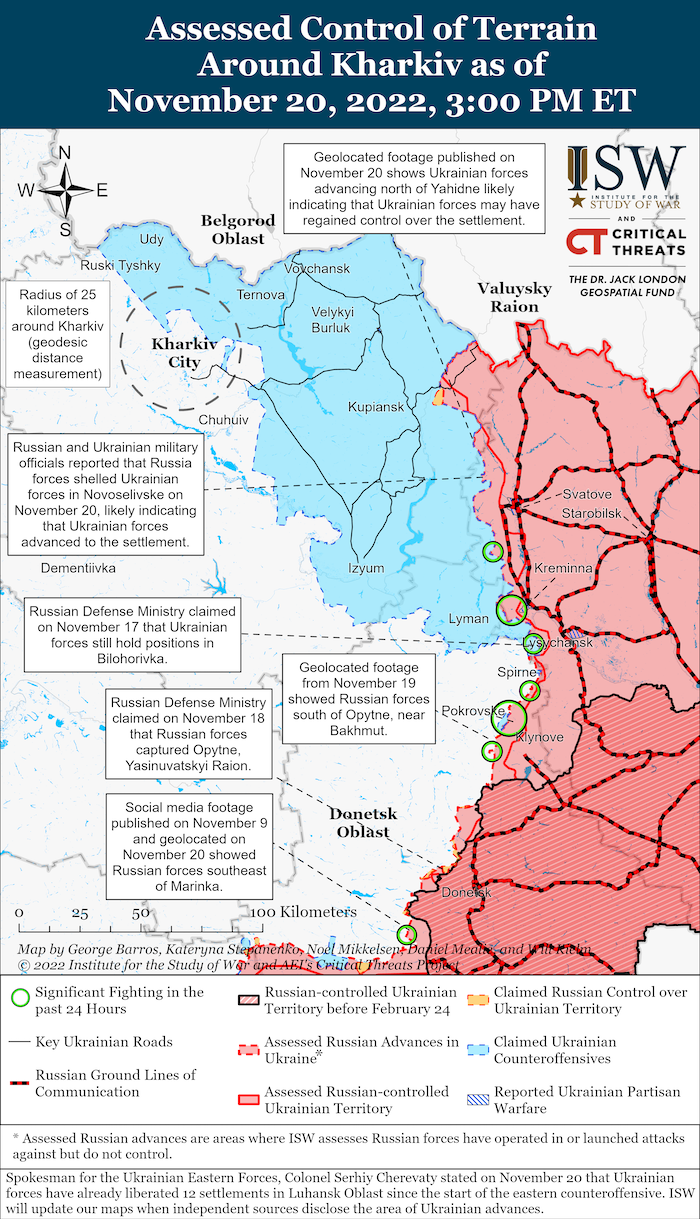
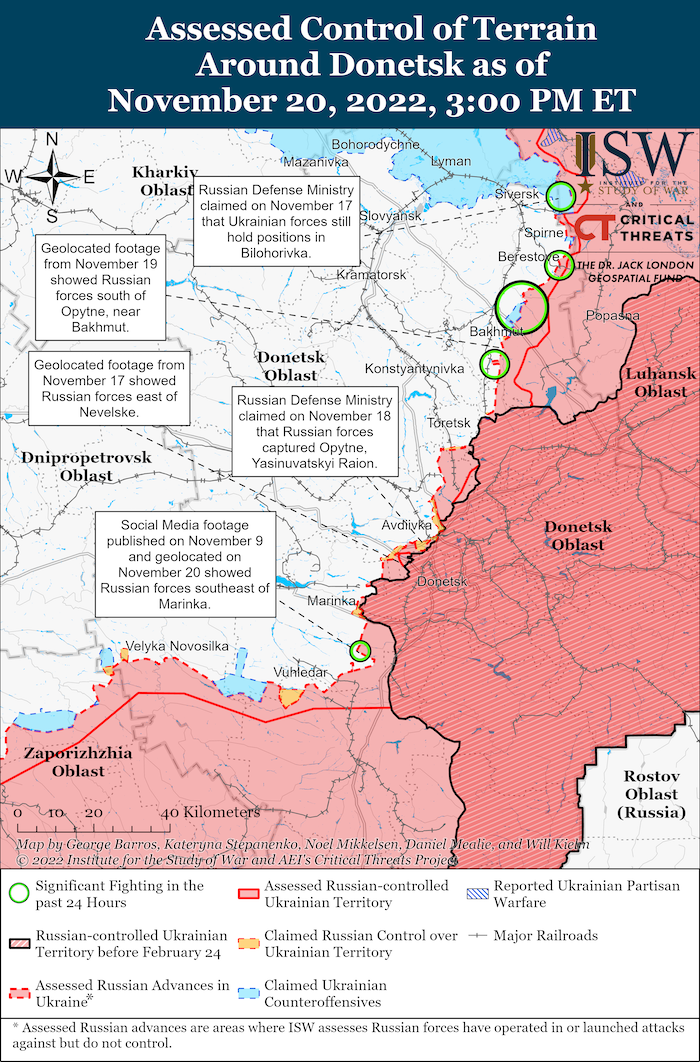
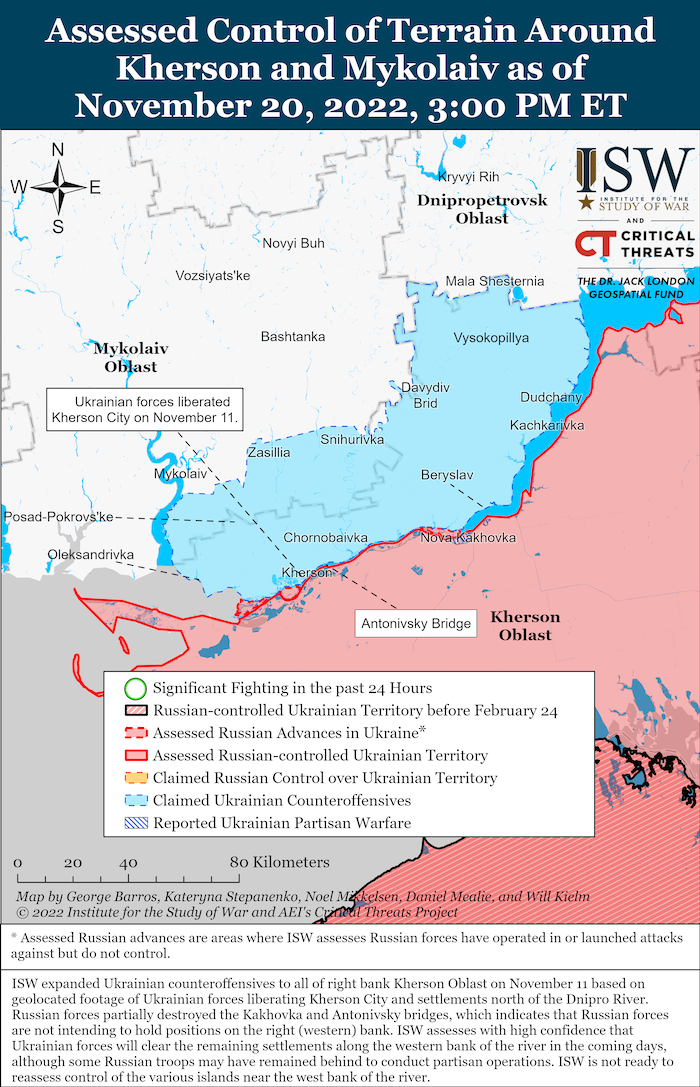
Military Updates
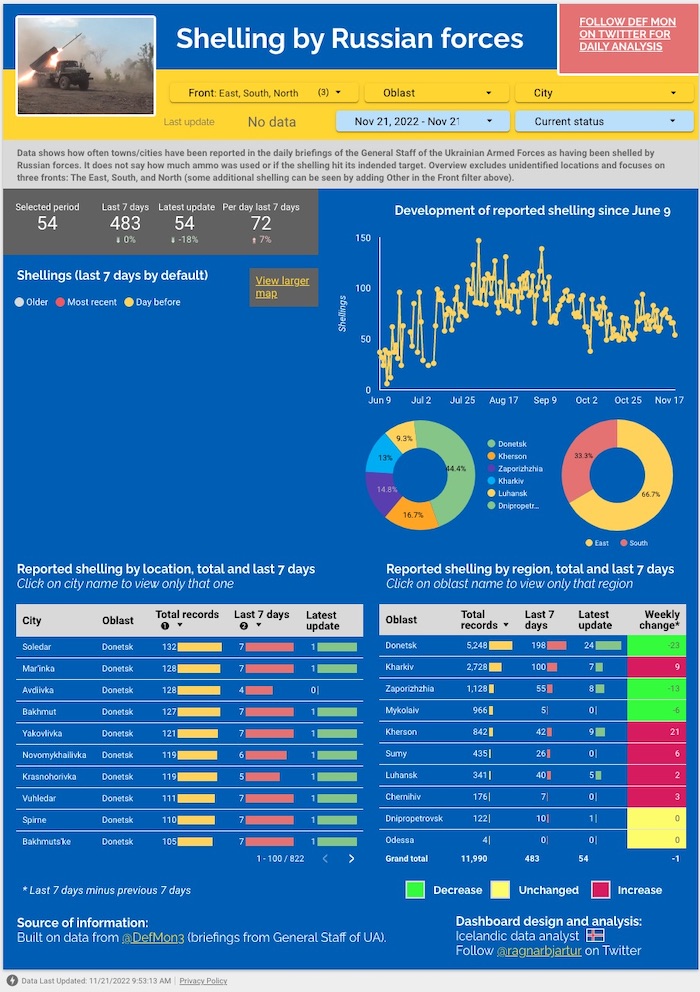
Regional Updates
https://twitter.com/EuromaidanPress/status/1594366106055380993 In Kherson Oblast, Russian soldiers continue looting. The trucks of Russian troops carrying stolen Ukrainian goods have been repeatedly seen across the Kherson Oblast. The large-scale looting caught the eye of Russian authorities, and they imposed limits on illegal transporting, First Deputy Chairman of the Kherson Regional Council, Yuriy Sobolevskyi, said. Euromaidan Press.The first train arrived in Kherson
— Euromaidan Press (@EuromaidanPress) November 20, 2022
200 passengers who purchased "ticket to victory" before Kherson deoccupation went on the train
Such tickets can be also bought to Mariupol, Donetsk, Luhansk, Crimea—and used after the de-occupation of these cities https://t.co/Mn4PifVpSz
Tankers stopped entering Russian Novorossiysk to export oil after an alleged drone attack on the terminal
According to British Defence Intelligence, (last 48 hours):
- Over the last seven days, intense artillery exchanges have continued around the Svatove sector in Luhansk Oblast in north-eastern Ukraine. As on other parts of the front, Russian forces continue to prioritise constructing defensive positions, almost certainly partially manned by poorly trained mobilised reservists.
- With Russia’s south-western front line now more readily defendable along the east bank of the Dnipro River, the Svatove sector is likely now a more vulnerable operational flank of the Russian force.
- As a significant population centre within Luhansk Oblast, Russian leaders will highly likely see retaining control of Svatove as a political priority. However, commanders are likely struggling with the military realities of maintaining a credible defence, while also attempting to resource offensive operations further south in Donetsk. Both Russian defensive and offensive capability continues to be hampered by severe shortages of munitions and skilled personnel.
Losses of the Russian army
As of 21 November, the approximate losses of weapons and military equipment of the Russian Armed Forces from the beginning of the war to the present day:
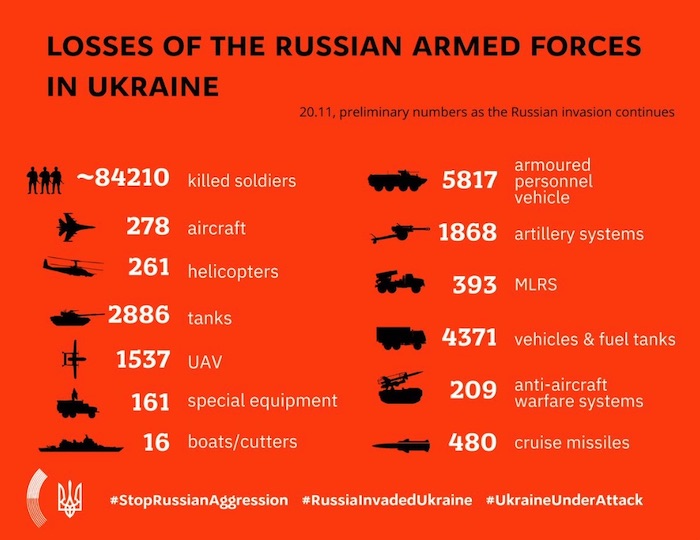
Humanitarian
https://twitter.com/MFA_Ukraine/status/1594261398955380737 Kherson is at the edge of a humanitarian catastrophe. The residents do not have water, power and heat in freezing temperatures. https://twitter.com/EuromaidanPress/status/1594255911844986882Environment
IAEA warns whoever was behind ‘powerful explosions’ at Zaporizhzhia nuclear plant is ‘playing with fire’ - CNN. "Explosions rocked the Zaporizhzhia nuclear power plant in Ukraine this weekend, renewing concerns that fighting so close to the facility could cause a nuclear accident. The head of the International Atomic Energy Agency (IAEA), Rafael Grossi, said that whoever was responsible for the attacks was “playing with fire,” reiterating a warning he made in September," wrote the publication.
https://twitter.com/EuromaidanPress/status/1594487505830682624️Legal
Russia left a trail of mined kindergartens and torture chambers in the Kharkiv oblast. After Ukraine’s Armed Forces drive the Russians out of any populated area, they discover that the retreating invaders have left mines in kindergartens, in playgrounds and in people’s homes. Although such deadly reminders of the Russians’ occupation are found on all liberated territory, the Interior Ministry reports that the Kharkiv oblast is especially affected. Read more here.#Russia left a trail of mined kindergartens and torture chambers in #Kharkiv oblast, #Ukraine #StandWithUkraine #RussiaWarCrimes #StopRussia #Izium https://t.co/tkPScnrJu8 pic.twitter.com/4giTVFVCcc
— Halya Coynash (@halyapuff) November 20, 2022
Support
https://twitter.com/EuromaidanPress/status/1594429524128796672 The European Bank for Reconstruction and Development and Mariupol's Mayor Vadym Boychenko signed a memorandum on rebuilding Mariupol. EBRD will prepare a report on the damage assessment. Ukraine receives 2 batteries for Crotale air defense systems from France. France has also been training the military on the use of weapons it provided, including Milan & Mistral missiles & VAB armored personnel carriers, Defense Minister Sebastien Lecornu said. https://twitter.com/EuromaidanPress/status/1594412029108002818 Sweden’s 9th package of security assistance for Ukraine is $282 million which is more than the previous 8 packages combined. As expected, it includes air defense systems, vehicles, and ammunition. In addition, Sweden also provides humanitarian aid for Ukraine and Moldova.Sweden’s 9th package of security assistance for Ukraine is $282 million which is more than the previous 8 packages combined
— Euromaidan Press (@EuromaidanPress) November 20, 2022
As expected, it includes air defense systems, vehicles, ammunition. In addition, Sweden also provides humanitarian aid for Ukraine and Moldova. https://t.co/pFMR4y86mQ
Massive Russian missile attacks confirm need to recognize Russia as state sponsor of terrorism – Ukraine President’s Office. Massive missile attacks confirm the need for the European Parliament to adopt a resolution designating Russia as a state sponsor of terrorism, said Ihor Zhovkva, Deputy Head of the Office of the President of Ukraine, during a meeting with a delegation of the European Parliament, Ukrinform reports. Euromaidan Press.
New Developments
Oil and gas ban can stop Russian war against Ukraine – Ukrainer. Russia uses energy supplies to Europe as blackmail over the war in Ukraine. The sale of gas and oil also allows Kremlin to get money to continue its illegal invasion, Ukrainer writes. Euromaidan Press. https://twitter.com/EuromaidanPress/status/1594389524423053312Assessment
- On the war.
The Institute for the Study of War has made the following assessment as of 20 November, 2022:
- The Ukrainian Main Military Intelligence Directorate (GUR) reported on November 20 that Russian special services are planning false flag attacks on Belarusian critical infrastructure facilities to pressure the Belarusian military to enter the war in Ukraine. The Ukrainian General Staff added that Ukrainian officials have not observed the formation of any Belarusian assault groups. ISW continues to assess that it is unlikely that Belarusian forces will invade Ukraine.
- Russian and Ukrainian sources reported ongoing fighting along the Svatove-Kreminna line on November 20. Russian sources noted that deteriorating weather conditions are impacting hostilities.
- A Ukrainian military official stated that Ukrainian forces have liberated 12 settlements in Luhansk Oblast since the start of the eastern counteroffensive.
- The Russian Ministry of Defense (MoD) claimed to strike a Ukrainian troop concentration in the area of Novoselivske, Luhansk Oblast. The Russian MoD previously claimed to repel Ukrainian attacks on the settlement, and this claim might indicate that Ukrainian forces advanced to the settlement.
- Russian forces continued offensive operations in the Bakhmut, Avdiivka, and western Donetsk directions.
- Ukrainian officials reported that Russian forces continued to transfer some forces from the east (left) bank of the Dnipro River to other operational directions, but still maintain a significant force presence in southern Kherson Oblast.
- Ukrainian and Russian sources reported that shelling damaged the infrastructure of the Zaporizhzhia Nuclear Power Plant (ZNPP). One Russian milblogger claimed that the shelling came from Russian-controlled territory south of the plant, but most Russian sources accused Ukraine.
- Russian occupation officials may have purged the occupation Mayor of Enerhodar Alexander Volga. Some Russian sources claimed that Volga received a promotion within the occupation administration.
- Russian military officials continued mobilization measures amid reports of ongoing resistance and poor conditions.

